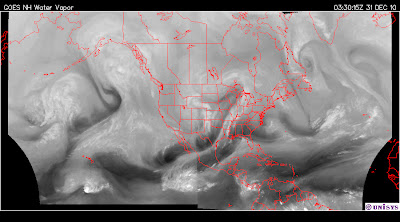0330.15z
UNISYS Water Vapor Hemispheric Satellite
I hesitate to use the word 'with redundancy' so much as 'in redundancy' because these is actually ONE FRONT with two vortex occurrences divided by a brief 'high pressure' between them.
Within the 12 hour loop is a clue about the dynamics that might mask the final volatile outcomes of this NEW system dynamic that may have confused meterologists and meterological equipment including tornado sirens.
The 'air pressure' involved with this dynamic appears to be irregular in its presentation and there are drastic changes along a single 'vortex front' within short periods of time.
In the 12 hour loop at the title to this entry it is noted at 0330.15z there is a vortex over the central USA. Immediately behind it is a clear and strong high pressure 'canyon' (if you will.). Immediately behind that 'canyon' of high pressure is a 'developing' vortex 'hidden' within the dynamics of the quickly changing front.
As time passes the 'high pressure' canyon begins to dissipate the first 'front boundary' only to reveal a 'developing' front boundary with more unstable air than the first because it is in oscillation with the primary front boundary.
The 'thing' is this. When vortexes are 'developing' there are huge unstable dynamics that act in oscillation to achieve 'formation.' Not so much stability as one might traditionally think of it as stabiliy, but, more a 'formation' of air that is manifested in a discernable system. No different than the tornadoes at the periphery of hurricane low pressure systems, these vortexes will achieve some very funky dynamics that defy traditional definations and terminology.
The dynamics of these vortexes have not ceased since they first appeared on October 4, 2002. They have only 'increased' in dynamics, both 'number' and 'velocity.' As the Earth sustains these high heat indexes, the 'ocean of air' will expand and several dynamics change. The 'molecular mass' of air isn't the issue, it is consistent, however, the 'space' that air demands when it expands under a 'heat dynamic' will result in 'air piling up' while attempting to find 'formation' that will allow 'heat relief.' These vortexes are the manifestation of expanded 'space demands' with higher energy gradiants.
I am not surprised Earth is now showing 'vortexes in redundancy' as its next measure of 'formation.' Each hemisphere has seen vortexes 'at maximum' and what then is to follow? Literally, a 'piling on' of the same dynamics in redundancy. This makes a great deal of sense to me. There are limited options for air movement on Earth. Then all those options are at maximum capacity the next dynamic is redundancy.
This is a matter of examing the air pressure dynamics of THIS system to realize how and IF it can be predicted. It seems to me it can be predicted as it was 12 hours of turbulence that manifested in the tornado. These dynamics can become very 'tight' in analysis as time goes on and increased redundancy is realized.
Good luck.
CINCINNATI, Ark. (AP) (click here) — Three people have died after a tornado slammed into a tiny town in northwest Arkansas near the Oklahoma state line early Friday, authorities said.The tornado hit Cincinnati sometime between 6 a.m. and 6:10 a.m., said Joe Sellers, a meteorologist with the National Weather Service office in Tulsa, Okla.
The storm killed three people and caused "lots of injuries" in Cincinnati, about 20 miles west of Fayetteville, Washington County Sheriff's Office dispatcher Josh Howerton said. He said the tornado caused damage in downtown Cincinatti along State Highway 59 and through most of the western portion of Washington County.
The Arkansas Department of Emergency Management confirmed that three people died in the tornado, and said property has been damaged and power is out throughout Washington County....

































